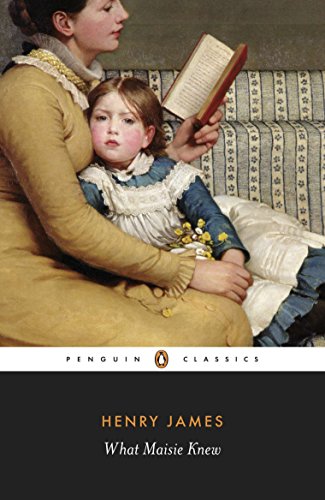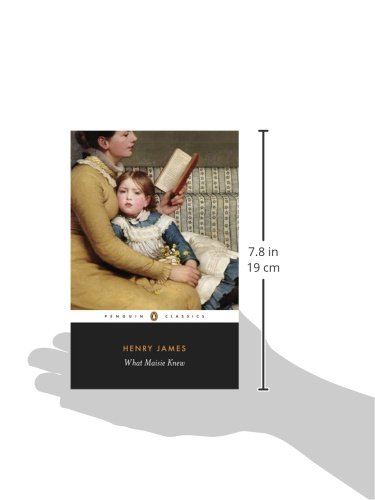Customer Services
Copyright © 2025 Desertcart Holdings Limited



What Maisie Knew (Penguin Classics)
U**A
Written by a Master of the Language
I chose the "I love it" rating because the writing style of Henry James is unsurpassed. This book differs from some of his other books in that there is no tension between an American and the Europeans he is living among but the situation in What Maisie Knew has many similiarities to his other books in that Maisie is shuttled between two parents, each with their own lifestyle, ideation set, and world view.
J**E
Victorian Literature
Not a huge fan of Henry James. I have to read it for class. But the book came in perfect condition!
P**.
interesting readin
I started reading it and found it ponderous and heavy. It's on a shelf.
L**A
Five Stars
Love this book! Very well written.
J**K
Well she knows a fair amount
Briefly a discourse on stars.I wasn't sure whether to give it four or three.maybe three and a half ?Enough of that !The most important thing to know about this book is that it is by Henry James.That tells you something.You aren't in for a casual beach read.It's not the Golden Bowl.You aren't subjected to either the agonies or ecstasies of that book.It's comparitively easy but ot that esay.The plot is realatively simple.At the beginning Maisie is (I think ) 6 years old .It's London 1890s.Her parents have divorced and custody split between them.The truth is neither of them really wants the girl.Both remarry and their new spouses are more interested in Maisie than her parents.Theyare also interested in each other and start an affair.Meanwhile their respective spouse also embark on multiple affairs.Maisie is just - around.The parties most interested in her is her somewhat dotty old governess.At a certain point , her parents completely abandon her and the final resolution of her custody is rather unusual.By the way , how old Maisie is at this point, is unclear.Overall the book is quite good but it does drag on a bit.It doesn't hit the highs of THE GOLDEN BOWL( but then again it doesn't hit the lows either).It doesn't have the ingeniousness of a lot of the short stories like The PUPIL.It really needed to be shorter.Yet as always in my experience of James , he's brilliant in a way that is hard to define.In the conventional sense this is not intellectual material.T.S. Eliot's comment on James- he had a mind so fine that no idea could violate it- has been repeated to the point of cliche.I'm not entirely sure what it means but I think it is not only true but an accurate compliment.This is on display in MAISIE.I suppose you could read it as a form of social commentary and I think it's fair to assume James deplored what was on view .But it strikes me that James was always playing for higher stakes.He even ( arguably) satirizes this in THE PATTERN IN THE CARPET.Sure MAISIE is about irresponsible adults defaulting on their responsibility to their own children.However it's even more "about" words and states of conciousness.(And I admit that's difficult to explain and may be beyond me).James is always a bit of a mystery to me.It's amystery I like to explore.
R**S
Timeless tale of parental custody issues
One of Henry James’s major themes in his novels is the foolishness of European and American aristocratic society of his time, circa 1900. His novel What Maisie Knew points up this theme almost without trying. Maisie is a precocious young child. When we meet her, very young, she is at the center of a court battle for custody. Each of her parents wants custody—not because they love their daughter, but, as in so many battles of this nature, they want supremacy. As a result, each is given six consecutive months a year with the child. Maisie grows, and as she does, she is introduced to her mother’s new husband and her father’s new wife. They, too, struggle for Maisie’s attention, but this time because they seem to care for her. Enter the mix is Maisie’s governess Mrs. Wix, who, too, cares for the girl. But the struggle for supremacy continues, and all of the adults are foolish indeed. The edition I read was created for the release of the 2013 film of the novel, a film whose setting has been updated to “today.” And that’s the beauty of this story: whether ancient times, the early 1900s, or the early twenty-first century, adults are going to be foolish and custody battles can get ugly. My only complaint is that I often got bogged down in the pronouns. When James said “she,” I often got confused as to which “she.” Was he referring to Maisie, the governess, the blood-mother, the step-mother? I found myself re-reading whole passages. Some will say that James strikes them as that way in all his novels: confusing and antiquated in his prose. But I’ve read nine or ten of his novels, and this is the only one I’ve gotten lost in. I love his writing. Yes, it is a style of another era, but his characters are rich and flawed and totally believable and his plots are engrossing and relatable.
M**S
It is undoubtedly a work of art, but hardly one which we wish to hang on your walls
What Maisie Knew is a 1897 novel by Henry James, about a young girl, tossed around between two parties in a vengeful divorce. They fight over custody of Maisie, and fight just as hard when each parent thinks they are being expected to spend too much time with the child. Then there is a sub plot of nannies and guardians who themselves have affairs with each vile parent, and with each other, and fight over Maisie!This plot sounds like a kind of nineteenth century version of Dynasty. The tone of the writing, however, is more nineteenth century literary fiction. The story is told from the point of view of Maisie, who is both confused by the machinations of adults, and able see through the self-serving fictions adults cook up to make themselves look good. We see events through Maisie’s eyes, but rather than the narrative voice remaining with her, we hear instead the tone of a world-weary, adult with literary pretensions. So the viewpoint and the voice make for an odd mixture, a combination of the innocent, and the knowing, which is fitting for the book’s preoccupations.This is a very artful book, reflecting on the contradictions of knowledge and deception, innocence and experience. As just a brief example - Maisie always sees the best in everybody, which is a lovely quality. But admirable though this quality is, it has the practical effect of making her believe in whoever she is with at any particular moment. Her guileless effort to be loyal to everyone, can also have the appearance of flighty disloyalty.A number of reviews of the book are included at the end of the Penguin edition. One from the Manchester Guardian of 1897, concludes by saying:“It is undoubtedly a work of art, but hardly one which we wish to hang on your walls.”I think this sums it up. What Maisie Knew is a very clever book, but is by no means an easy and relaxing read. The world of childhood only comes to us through the voice of an adult, who loves his long sentences and even longer paragraphs. This is a children’s book for the sort of adult who is willing to suffer for their literary rewards
A**N
I RECCOMEND YOU READ THIS EDITION.
This is the 1897 edition of WHAT MAISIE KNEW, Henry James 1908 revision made the book more Jamesian,I prefer the original; here are two examples.CHAPTER XV1 (1897) a very different class of personCHAPTER XV1 (1908) lower in the scale of "form" thanCHAPTER XV111 (1897) her tears CHAPTER XV111 (1908) the friendly suffusion of her eyes.I also like the Christopher Ricks introduction.
M**T
VERY heavy going....
Pages and pages of turgid prose saying nothing......Paragraphs going over 2 pages....Hardly any story.....So pleased modern writers have not followed this Victorian style....
C**N
The established text is preceded and followed by highly authoritatively ...
The established text is preceded and followed by highly authoritatively researched sections, which are also adapted to the general reader's ability. The context of the novel is offered from several points of view: James's own chronology, his notebook entries that present the gestation of the idea, and a contextual section on elements of the then culture and topography. The volume even includes James's Preface to the 1908 New York Edition as an authentic snapshot of the art taken by the author himself.
S**R
Five Stars
Excellent quality.
Trustpilot
2 months ago
1 month ago
3 weeks ago
1 month ago